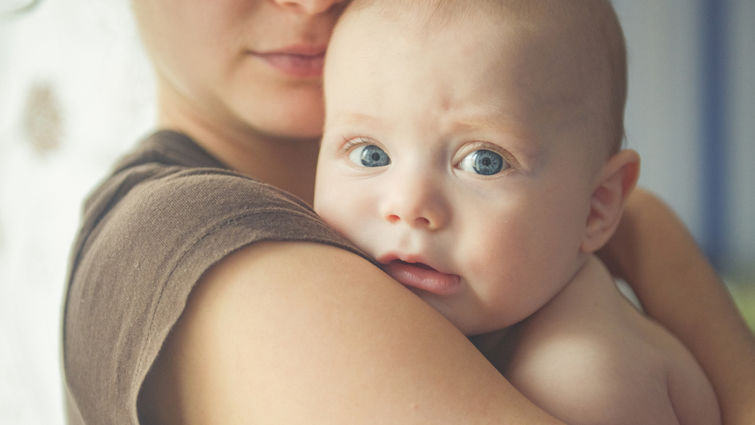
Eczema is said to be the itch that rashes. While frequently worse in the winter, air conditioning used in the summer months also makes babies susceptible to eczema flares as it dries out the skin. Sweating and chlorine from pools can also be triggers.
Babies are pre-disposed to eczema because their skin barrier is more fragile than an adult’s, leadingto dry skin as a consequence of a high water loss and an enhanced penetration of irritants and allergens into the skin. To remedy the discomfort, infants will rub their skin on surfaces to get rid of the itch. This friction worsens skin breakdown and creates rashes.
Eczema in babies presents in two main ways. First, a baby may seem fussy or irritable for no reason or constantly rubbing his or her cheeks or body on surfaces to get rid of the itch. Second, a baby may have dry, flaky skin that can be either skin tone or appear pink or red.
Pediatricians at Loma Linda University Children’s Hospital understand just how uncomfortable and frustrating this skin condition can be for both infants and parents — we want to help.
Generally, parents will turn to eczema creams or lotions to soothe their child. Here are three of my tips for choosing a cream that will work best for your baby:
Creams are better than lotion
Parents should look for thicker creams because they create a better barrier on an infant’s skin and therefore decreases the itch and skin breakdown.
Fewer chemicals and more natural oils are better
Be aware that all infants are different — sometimes it’s trial and error to gauge which creams and natural oils are best. Give any new product a minimum of two weeks to see if it works before abandoning it — the body’s healing process takes time.
Don’t be afraid to go generic
As a pediatrician, I look for creams that have known soothing properties or natural ingredients, but there are many on the market that work well. Parents don’t have to spend lots of money on the most expensive creams. Often, the generic versions of well-known brands work just as effectively.
Here are a few other key things to remember about the importance of paying attention to skin care for babies:
- Babies should be bathed in warm water, not hot, for 10 to 15 minutes at a time. They should be immediately patted dry and within three minutes a thick, moisturizing cream should be applied from neck to toes and carefully on any facial areas that are affected.
- Areas that are skin-toned but dry and flakey need a moisturizing cream minimally twice a day at least, but often more frequently.
- Areas that are pink or red present evidence of inflammation. Cream alone may not calm that down and those areas may require a steroid cream. Parents can start with an over-the-counter 1% hydrocortisone cream two times a day for up to seven days, but if this does not resolve the redness, they should see their physician. Steroid cream should be used at least one hour apart from a moisturizing cream for best effectiveness and should not be put in a diaper area or near eyes without discussing with the physician first.
- If honey crusted scabbing is noticed over broken apart skin, the family should seek the advice of their physician because this can be an indication of bacterial growth in that area.
Sadly, it’s difficult for families to identify all the triggers for their baby’s eczema flares, which can be frustrating for parents.
Breastfeeding moms should pay attention to see if their child breaks out more frequently after certain food types. But in general, we do not ask moms to have a very restrictive diet because this does not create the healthiest breastmilk. A diet rich in fruits, vegetables, fish, and Vitamin D may decrease eczema in breastfed babies. Families who have chosen to formula feed should not jump from formula to formula, but instead should have a structured plan with their physician, and any new formula trial should be given a minimum of two weeks before a decision is made to move away.
Babies should be dressed in only cotton clothes without itchy adornments, like lace or fringe near the skin. Clothes should be washed in detergents that are “free and clear” of perfumes and dyes and without harsh chemicals. It’s best for these clothes to be double rinsed. Dryer sheets should be avoided.
While eczema is a frustrating infant skin problem, the good news is that there are lots of options on the market to help. Seek your pediatrician’s advice early — we are happy to answer your questions and want your baby to be as comfortable as possible. Keep the hope and knowledge that most children outgrow eczema.
Call us today at 800-825-KIDS to schedule an appointment with a pediatrician or schedule online using MyChart. Not signed up in MyChart? Learn how to enroll here.
—Alexandra Clark, MD, is the division chief of general pediatrics at Loma Linda University Children’s Health.
Meet Our Providers
Alexandra M. Clark
Division Chief of General Pediatrics
Specialties: Pediatrics, General Pediatrics
Learn more about this provider
